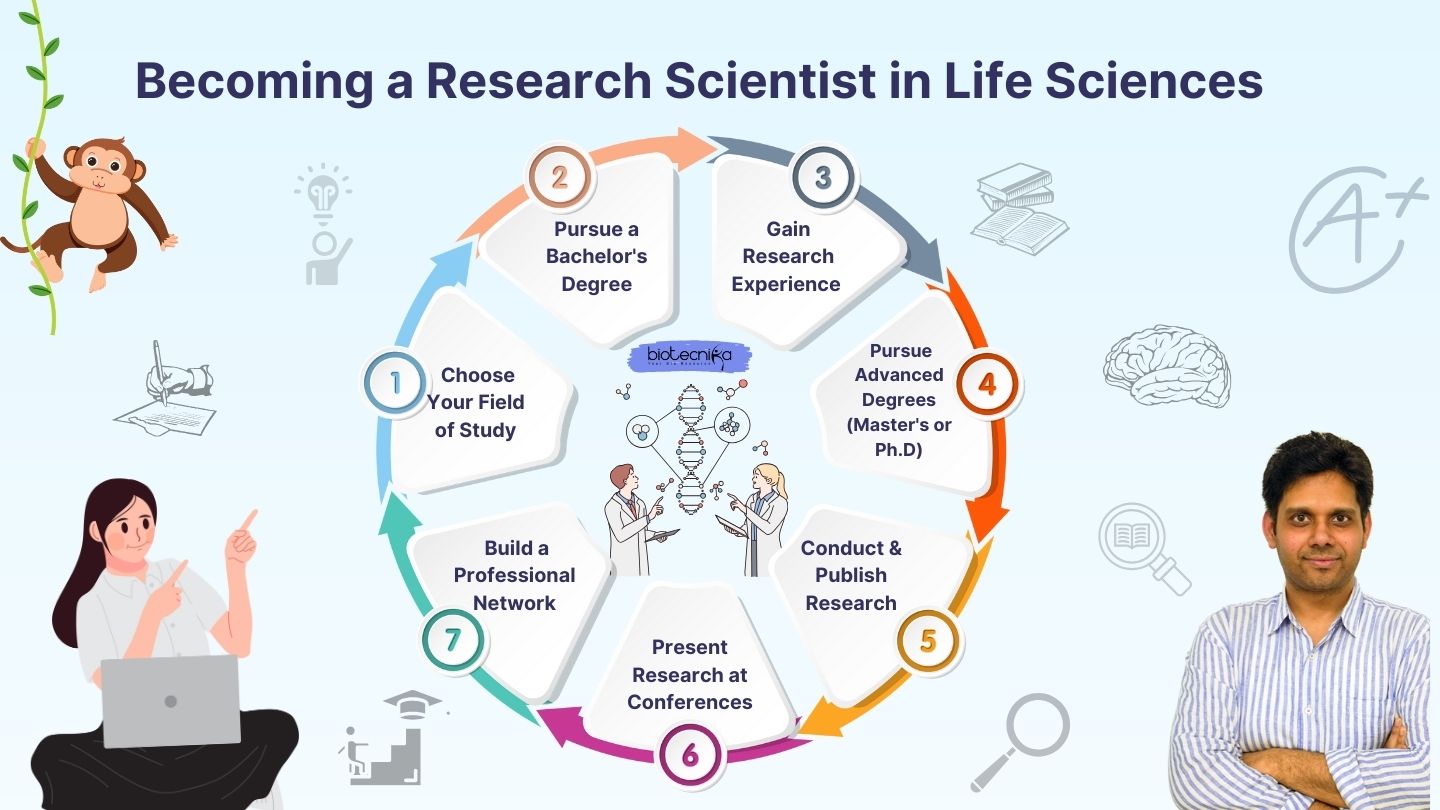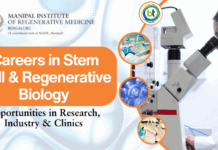How To Become A Research Scientist in Life Sciences?
Gone are the days when students wanted to settle for less; in today’s era, when you have invested so much money already into your education, targeting a job that reflects your studies is a wise decision. Becoming a scientist is always a dream for every biotech professional, So stay back, relax, and read this article at your leisure. It will be a game-changer and an eye-opener for you if you are targeting a career in research.
Bill Gates once said, “The world has to prepare for pandemics in the same serious way it prepares for war.” But do you know how can we do that? And who are our soldiers in this war? Well, let me tell you that they are our Research Scientists. They are on the frontlines of pandemic preparedness, developing vaccines, diagnostic tools, and therapeutic solutions to prevent and control disease outbreaks.
Do you also want to be one of them? Are you passionate about discovery and innovation?
Becoming a research scientist in life sciences offers a career filled with intellectual challenges, hands-on experimentation, and opportunities to contribute to the greater good of society.
Ever thought about what it means to be a Research Scientist?
A Research Scientist is a dedicated professional responsible for conducting scientific experiments, data collection and analysis, and making a significant contribution to the scientific world. They work in different disciplines of life sciences, such as molecular biology, microbiology, genetics, biotechnology, and many other fields. Their primary aim is to contribute to the scientific community with their research that can improve the quality of life, conserve the environment, and explore science.
Research scientists in life sciences are not confined to their field alone. They collaborate with other scientific disciplines, such as chemistry, physics, bioinformatics, computational biology, system biology, and data science, to enrich their research and broaden their understanding.
What is the required educational qualification?
Even before we get started with this sub-topic, remember learning is a process and not a destination that will entitle you to become a scientist. To pursue a career as a Research Scientist, one should have an educational background in biology, life sciences, microbiology, biotechnology, or any related field of life sciences. There are various educational paths that will help you create a career in the field of life science as a research scientist. Some of them are listed below.
- Undergraduate Degree – Bachelor’s Degree in Biology/ Microbiology/ Biotechnology or any life science-related subject.
- Graduate Degree – Master’s Degree in Life Sciences
- Doctorate (Ph.D.) in Life Sciences
- A postdoctoral degree often becomes a permanent stepping stone in securing a position in the research and academic field.
Additionally, you can complete Certificate Programs and Specialized Training sure as
- Basic CRISPR Certification
- Artificial Intelligence in Biology Certification
- Next-gen sequencing Training
- Clinical Data Management Course
- Molecular Biology Techniques Training
These courses and training will enhance your knowledge in the field.
What are the steps to Become a Research Scientist in Life Sciences?
- The first step is to select a field of study that interests you, such as biology, biochemistry, or any life sciences-related field.
- Earn a Life Science bachelor’s degree.
- Look for opportunities to gain research experience while you’re still an undergraduate such as internships in government-funded labs, academic institutions, and biotech industries. An internship can help you learn about research protocols and develop essential laboratory skills.
- A master’s or doctoral degree is usually required to advance your career.
- Engage in research projects related to your area of interest during your academic years.
- Publish your research findings in reputed journals.
- Present your research at conferences.
- Connect with professionals in your field by attending conferences, seminars, and workshops.
Unlocking Potential Exciting Career Paths for Research Scientists in Life Sciences
There are numerous career opportunities in academics, industry, and government sectors for a Research Scientist in Life sciences. In academia, you can work as a postdoctoral researcher or as a professor. You can work as a research scientist, senior researcher, or director of research in various industries such as biotechnology, pharmaceutical, or health care. Whereas in the government sector, you can work in government agencies like The Institute of Life Sciences, The National Centre for Biological Sciences (NCBS), The Bangalore Life Science Cluster (BLiSC), the Defence Research and Development Establishment (DRDE), and many more in India and international you can work in National Institutes of Health (NIH), or European Molecular Biology Laboratory (EMBL). Additionally, you can also work in nonprofit organizations or startups.
From Labs to Life: The Hottest Trends Shaping Life Sciences Research
As a researcher, it is important to stay updated with the new emerging fields that can drive innovation and advancements in your field. The emerging fields in life science include
- Synthetic biology
- Gene editing
- Personalized medicine
- Metagenomics,
- Bioinformatics, and
- Artificial Intelligence in biology.
Synthetic biology focuses on designing and constructing new biological systems, such as biofuels and bioproducts. Gene editing technologies like CRISPR help researchers modify genetic codes by editing genetic material. Personalized medicine is a new trend in the healthcare and pharma industry, and it focuses on tailored treatments based on individuals’ genetic profiles and health histories. Metagenomics is a study of microbial genomics obtained from an environmental sample using sequencing approaches. Bioinformatics and artificial intelligence help the researcher scientists to analyze complex data into simple data. These emerging fields hold great potential to revolutionize disease diagnosis, treatment, and prevention.
How Does a Research Scientist Balance Challenges with the Joy of Discovery?
As an aspiring research scientist, you should remember that the life science field is not always filled with glory. One faces many challenges, such as
- securing funds for research,
- staying updated with the new emerging fields,
- adapting the latest technologies,
- analyzing complex data and
- no proper work-life balance.
With the evolving technology, scientists have navigated their research with the help of artificial intelligence and big data, which can be difficult to adapt. Along with the struggles, there are rewards that follow.
The rewards help the scientist to stay motivated. A few of the rewards can be
- Making an impactful scientific breakthrough
- Collaborating with renowned scientists
- Working on cutting-edge projects and
- Exploring new areas of science.
What are Key Skills for Aspiring Research Scientists?
The most important thing for being a successful scientist is skill sets. They need skills such as
- Technical Skills:
- Analytical Skills: they should be able to analyze complex data and interpret results, for which they need proficiency in statistical analysis and data visualization tools.
- Technical Proficiency: it is important to be familiar with laboratory techniques and protocols, such as molecular biology, sequencing, and CRISPR.
- Computational Skills: With the new technology, it becomes essential to be proficient in R/Python programming, bioinformatics tools, and AI/ML tools.
2. Soft Skills:
- Critical Thinking: One should be able to think critically and develop hypotheses, design experiments, and troubleshoot issues that arise during their work.
- Effective Communication: communication is the key. One should have strong written and verbal communication skills for publishing papers and presenting their scientific findings. Communication is important when applying for funding because the scientist has to explain complex scientific concepts to a wide range of audiences to raise funding for their research.
- Attention to Detail: Even small errors can make a huge difference in the result, leading to major discrepancies in research outcomes. So, scientists must pay attention to every small detail.
- Teamwork: one should be able to collaborate effectively with other scientists and professionals. Research is often collaborative, and strong interpersonal skills are essential for working in multidisciplinary teams.
- Time Management: Managing time efficiently to balance multiple research projects and deadlines.
How Will Research Scientists Transform Our World?
The future of research scientists in the life sciences is promising, with technological advancements like CRISPR, artificial intelligence, and single-cell genomics. These innovations will continue to drive disease understanding, diagnosis, and treatment progress in nanotechnology, AI-driven drug discovery, and precision agriculture. The demand for research scientists will increase, particularly in areas like personalized medicine, regenerative biology, and biotechnology. As the life sciences industry continues to evolve, scientists will need to stay adaptable, curious, and adept at communication and collaboration. With a strong foundation in science, technology, engineering, and mathematics (STEM), research scientists will play an important role in shaping the future of healthcare and medicine.
When you want to become a research scientist and are worried about how long it takes to become one. It’s important to remember that to be a research scientist, one has to require dedication, hard work, and passion. Research scientists contribute to human understanding of the world. This career demands a strong educational background along with practical knowledge. As you advance in your academic career, acquire the skills and hands-on experience. In a rapidly changing world, stay up to date with the latest technological advances and discoveries. These technologies have the potential to reshape the future of research. Life science is filled with many opportunities and a bright future. Now it’s your time to pursue a career as a research scientist and make a groundbreaking discovery.
As an aspiring scientist, stay curious, seek mentorship, and never stop learning.








































Hii sir!! I have been following you for quite a long time and because of you I have decided to pursue a career in this industry. I am a recent high-school graduate looking for internships in labs or any research projects in this field. It would be lovely to have an internship or work in any research project of yours. I want to explore and gain experience as much as I can before I get admission into a college!! I would be very grateful if you could launch some opportunities for students like me. Thank you!!